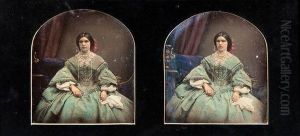Antoine Francois J. Claudet Paintings
Antoine François Jean Claudet, born on August 18, 1797, in La Croix-Rousse, Lyon, France, was a pioneering French photographer and innovator in the early days of photography. His contributions to the field were significant during the 19th century, particularly in the development and popularization of the daguerreotype process.
Claudet began his career in the glass industry, which led him to move to England in 1829 to establish a glass warehouse in London. His initial work was unrelated to photography, but his background in glass manufacturing would later prove beneficial to his photographic endeavors. Claudet became interested in photography after learning about Louis Daguerre's groundbreaking process of capturing images, the daguerreotype, which was made public in 1839.
Recognizing the potential of this new medium, Claudet quickly became one of the first practitioners of daguerreotype photography in England. He set up his own studio on the roof of the Adelaide Gallery, next to the Strand in London, becoming one of the first professional portrait photographers in Britain. Claudet's studio became a hub for innovation, where he experimented with lighting, camera improvements, and chemistry to enhance the quality and reduce the exposure time required for daguerreotypes, which initially could take several minutes.
He was granted a licence by Daguerre to work under his patent and with the help of scientist Sir John Herschel, he made significant improvements to the daguerreotype process, including the 'fuming' process with chlorine, which greatly improved the sensitivity of the photographic plate. Claudet also invented the red darkroom light, which is still symbolically used today, and he was one of the first to use painted backgrounds and accessories to give depth to his portrait photographs.
Outside of his technical contributions, Claudet was also known for his entrepreneurial spirit. He opened additional portrait galleries and worked on methods for mass-producing photographic images, which would lay the groundwork for the future of commercial photography. His work was widely recognized and appreciated during his lifetime, and he was awarded several medals for his photographs at international exhibitions.
Antoine François Jean Claudet died on December 27, 1867, in London. His legacy is marked by his numerous contributions to the advancement of early photography, both in technical innovation and in establishing photography as a commercial art form. While his name may not resonate as widely as some of his contemporaries, Claudet's impact on the development of photography as we know it today is undeniable.
